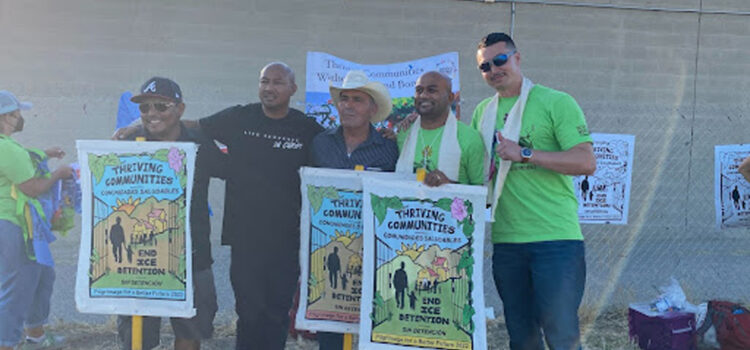
On May 29, there was a statewide pilgrimage led by fate leaders, community advocates, and community members that were formally in detention centers from various parts of the state; the goal was to bring awareness to the harms of immigration detention centers to stop the double punishment that immigrants are facing.
The pilgrimage started in Northern California and ended in Adelanto, California with two stops in Kern County at the Golden State and Mesa Verde detention centers.
Advocates have been pushing to close these facilities through Assembly Bill 32 which would ban private detention facilities that are primarily used to punish and incarcerate immigrants.
Another legislative attempted solution that the advocates are pushing for is the Vision Act. The Vision Act would end transfers from CBCR to ICE. With the Vision Act, people who are released from prison would not be able to be handed over to ICE.
“Advocates and immigrant rights activists are saying that is a cruel double punishment because people have now served their time for whatever crime was committed. They have been held accountable, they take responsibility for their actions, but then many of them spent much more time in immigration detention than even their jail sentence was,” said Maira Rios, a legal and advocacy assistant with the American Civil Liberties Union Foundation of Southern California.
Rios explained that during the time of COVID-19, many who were detained in immigration detention centers were released because of space inside the facility. Many of those who were released, showed up to court during their court day. The purpose of having detention centers is to make sure that folks show up to court. If folks are showing up to court without the use of detention centers, then there is no need for those facilities.
Advocates also explained that GEO took over the McFarland prison and turned it into a detention center. Many advocates spoke about how they did not agree with GEO and how detention centers should all be shut down.
Rios also explained during the event in Mesa Verde that the recreation time that those detained received was canceled that day. Therefore, those detained did not get to go outside that day.
“It can be inferred that GEO didn’t want those detained in Mesa Verde to hear our messages of solidarity because we had a microphone. It could have been heard if they would have been outside because we were right next to the yard, but they canceled it,” said Rios.
There were many stories of those who were formally detained. Many spoke about the treatment inside the detention centers — about the lack of medical care, not getting adequate medical care, and not getting nutrition through the foods they were given.
“As community members, we need to be focusing on this narrative to fit away from punitive systems because what it really does is create family separation. It creates people that are suffering,” said Rios.
Rios explains that there was a pattern of complaints from people that are still detained, and they should be getting good medical care and nutritious food to stay healthy. They really need medical care and if they were with their families they would be able to have access to these needs, and they would have also had support from their families.
“There is a big need for commissary funds because a lot of times the food that they are given is not adequate. They have access to a commissary where they are able to find different types of food but they are very expensive so people can not afford it so we have a local organization called [Kern Welcoming and Extending Solidarity to Immigrants] KWESI that provides commissary funds,” said Rios.
Rios recommends that community members be involved in community organizations to highlight awareness to shut down these facilities that are hurting immigrants, and she hopes that these facilities are shut down with the help of AB 32 and the Vision Act.